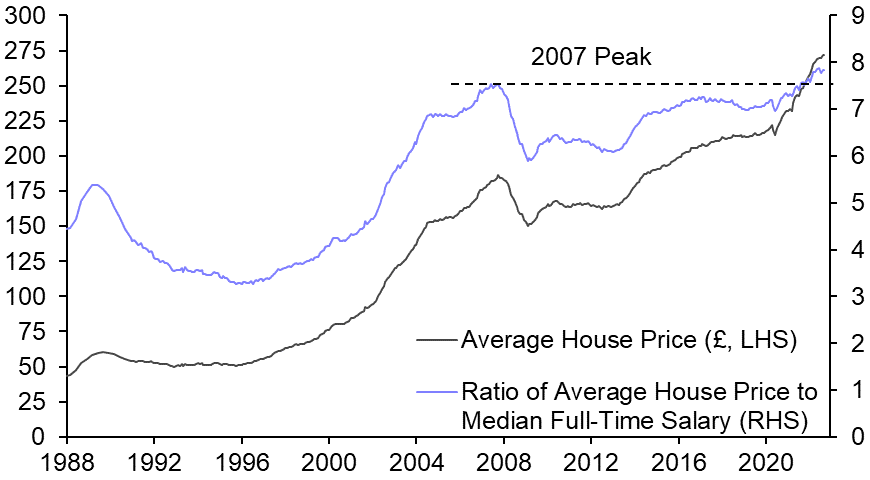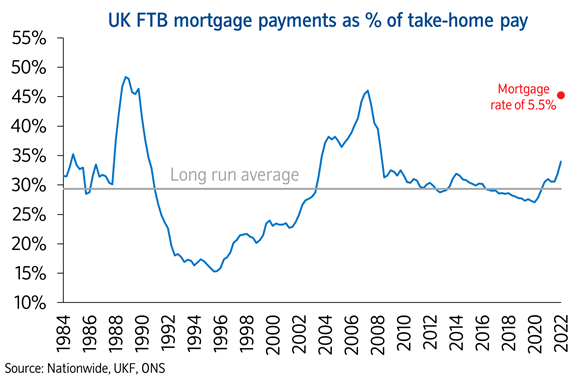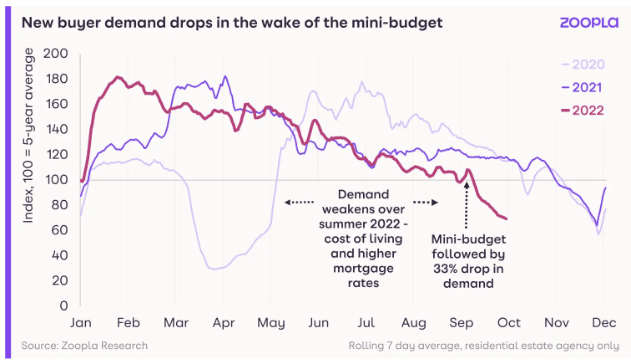UK House Price Forecast: 12% Drop Coming says Economist
- Written by: Gary Howes

Image © Adobe Stock
The fall in UK house prices has just begun, according to a new analysis.
On the day Nationwide reports the first fall in house prices in 15 months economists at Capital Economics to say they are anticipating declines of approximately 12% by 2024.
Nationwide said on November 01 annual UK house price growth slowed to 7.2% in October, from 9.5% in September, after prices fell 0.9% month-on-month in the first monthly decline since July 2021.
"The market has undoubtedly been impacted by the turmoil following the mini-Budget, which led to a sharp rise in market interest rates. Higher borrowing costs have added to stretched housing affordability at a time when household finances are already under pressure from high inflation," says Robert Gardner, Nationwide's Chief Economist.
Capital Economics' research finds quoted mortgage rates are now up to over 5% as the cost of finance steadily increases in line with Bank of England interest rate rises and the market's reaction to the 'mini budget' of former Prime Minister Liz Truss and her Chancellor Kwasi Kwarteng.
This spike in mortgage rates, "will turn the slowdown in demand already evident in the survey data into a collapse," says Andrew Wishart, Senior Property Economist at Capital Economics.
"Higher interest rates make it too expensive for many prospective buyers to borrow enough to purchase a home," he adds.
Capital Economics expects mortgage rates to come down to 4% by 2024, but warns house prices will have to fall by 12% before affordability improves enough for demand to recover and the fall in prices to bottom out.

Nationwide calculates the increase in mortgage rates to an average of 5.5% means a prospective first-time buyer earning the average wage and looking to buy a typical first home, with a 20% deposit, would see their monthly mortgage payment rise from around 34% of take-home pay to around 45%.
This is similar to the ratio prevailing before the financial crisis.
"The market looks set to slow in the coming quarters. Inflation will remain high for some time yet and Bank Rate is likely to rise further as the Bank of England seeks to ensure demand in the economy slows to relieve domestic price pressures," says Gardner.
The Nationwide report comes a day after Zoopla said buyer demand has dropped by a third since the mini-Budget, across all UK markets.
However, Zoopla said they don't anticipate any major impact on house prices to materialise until the first quarter of 2023 as it takes several months for pricing to adjust in the face of weaker demand.
Furthermore, Zoopla says mortgage rates look set to fall towards the end of this year and into 2023 to between 4-5%, and this is likely to be the new norm.
Gilt yields - a key determinant of mortgage rates - have fallen back since Chancellor Jeremy Hunt took over from Kwarteng and imposed fiscal discipline by overturning proposed tax cuts.
"The drop back in market interest rates now that sober policymaking has returned means we may have already seen the peak in quoted mortgage rates. But hopes that mortgage rates will fall back significantly and quickly are misplaced," says Wishart.
Nationwide says household balance sheets appear in relatively good shape with significant protection from higher borrowing costs, at least for a period, with over 85% of mortgage balances on fixed interest rates.
"Stretched housing affordability is also a reflection of underlying supply constraints, which should provide some support for prices," says Gardner.
Nevertheless, Capital Economics say house prices will trend lower over the next two years, with a fall of 12% expected between now and mid-2024.
"Given already-stretched valuations in London and the South, we think that these areas will see the largest falls in house prices," says Wishart.





